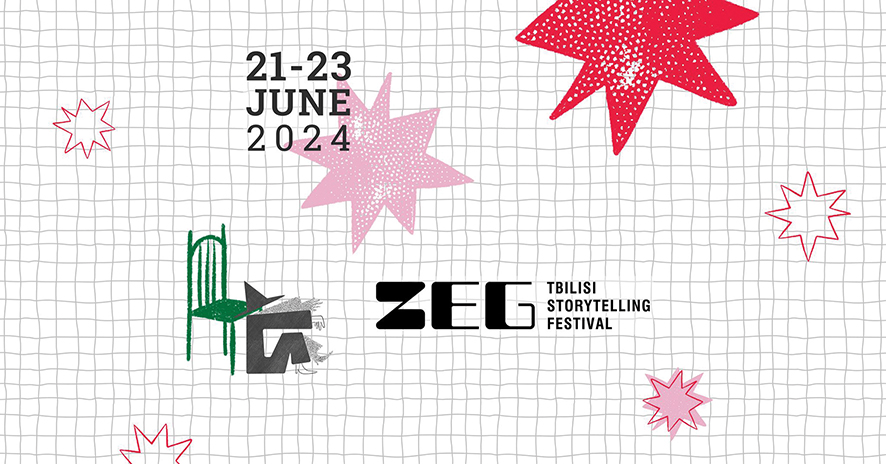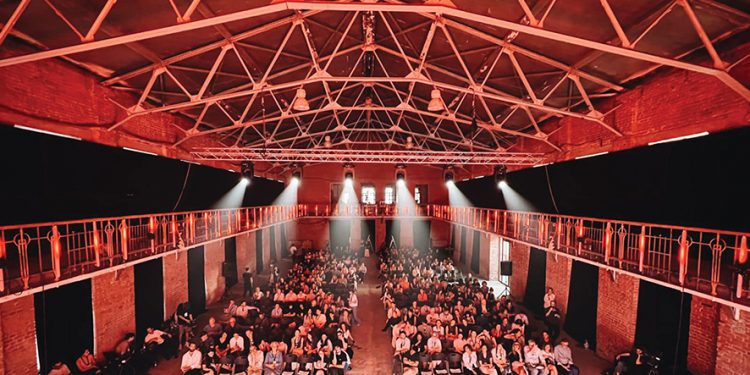When people hear the word ‘storytelling’, they may think of something made up, a restated or reenacted tale, or a person telling a story about their life or a specific moment. ZEG Fest brings a new definition to this word everyone so commonly knows.
Created in 2019 by Impact Hub Tbilisi and Coda Story, ZEG Tbilisi Storytelling Festival has broadened the term to allow speakers worldwide to come and tell their stories. This is done through conversations, images, products, film, and other platforms to connect people. Ketevan Ebanoidze, Co-Founder and Organizer of ZEG Fest, said the festival was created to give everyone, regardless of their background, a chance to talk and be inspired.
“No matter if you’re telling your personal stories or the story of your career or anything else, you need to know how to tell the story,” said Ebanoidze. “Every other person has a story to tell, and every industry has specifics on how to tell those stories.”
The festival commenced on June 21 with panel discussions, Q&A talks, and documentary screenings by various speakers. There were over 100 speakers and six parallel stages with simultaneous sessions throughout the weekend. Ebanoidze said this event differs from other festivals because guests can meet the speakers they listen to. It’s for this reason that there’s a breakfast, lunch, reception, and happy hour so everyone can talk and make connections, speakers and attendees alike. Ebanoidze explained that it’s a very democratic festival where everyone is on the same level.
The first night concluded with an opening ceremony that included a talk with some guests, a visual presentation about Georgia’s Gen Z revolution, and a performance. Saturday, June 22 began, and there were sessions about what philosophers can do in the age of AI, what role fiction has in the world, and how the foreign agent law in Georgia affects journalists. Genia Mineeva, Founder of Been London, had a session entitled ‘How to Style It’ with a product as the main storyteller.
Mineeva is a former BBC journalist who saw a problem with waste and wanted to do something about it. With no former knowledge of sustainability, Mineeva said she pursued an education on the topic and now has a company that turns waste, whether it’s plastic, leather, cotton, or other materials, into premium, luxury products. She believes that a physical product, such as one of her wallets or bags made of apple skin in replacement of leather, has the power to push people to adopt a different behavior, without having to use any words.
“Let’s tell the story to show the possibilities of how we can live slightly differently, how we can make our physical products differently instead of constantly taking from the environment,” Mineeva told GEORGIA TODAY. “We can reuse what we already have.”
According to Mineeva, storytelling is a tool that can change a person or make them reconsider things. She explained that one of her company’s goals is to have people think about how the things they use daily are made, whether from oil, animals, or a positive material, so they can enforce change where needed. She said storytelling is one of the most powerful tools we have as humans to evoke change, and Georgia has created an open space to use and talk about this.
Saturday night concluded with a screening of Georgia’s European Championship game against the Czech Republic, where many attendees gathered to watch and celebrate. Although the festival emphasizes speakers and connecting professionals of different backgrounds, whether journalists, dancers, filmmakers, activists, philosophers, etc., the event is also open to the public each year. Natasha Thalluri is an Indian PhD student at Harvard studying aspects of the Georgian language.

She said she heard about the festival through friends and thought it would be comparable to literary festivals in India that focus on fiction amongst other topics. However, Thalluri explained that the way ZEG portrayed storytelling differed from her expectations, even though she instinctively knew there were various ways to tell a story. Since the festival is based in Georgia and focuses on local and global topics, Thalluri said it was interesting to see issues and hear stories through this lens of the globe, that she otherwise would never have thought about.
“The way Indians see the world is one way, and when you talk to people from Eastern Europe and think about the experience of the Soviet Union and how it has affected them, I don’t think of the Soviet Union in the same way they do,” said Thalluri. “People my age have a very different understanding of what the Soviet Union is and its impact on global affairs.”
The festival’s last day was June 23, which began with optional walking tours, one entitled ‘A Walk Through Jewish Tbilisi’. It was led by Lasha Shakulashvili, lecturer of Yiddish at Tbilisi State University (TSU). He said he started doing tours in Tbilisi just two weeks after he had a fallout with TSU regarding the protests in Georgia against the Foreign Agents Law.
To him, storytelling is important because it’s a way to compete with other professionals in the same field who have better archives, documents, or more knowledge. Shakulashvili grew up with a blind grandfather, whom he would take on walks around Tbilisi and describe things to entertain him. He explained how he discovered the art of storytelling between his childhood and teaching at TSU.
Shakulashvili said that on his tours, he shows the face of a person or thing so people will remember the history he explains by relating it to what he shows as a visual. With his form of storytelling, he said he gets to explain the Jewish culture in Georgia, as well as Georgia as a country to his guests. To him, this means storytelling equates to coexistence.
“Humans cannot find a connection to a building or a calendar. They can find a connection to the person who lived in that building or who is in that newspaper article,” said Shakulashvili.
The last day continued with sessions such as how people live in exile worldwide as authoritarianism rises, how to respond to disinformation, and an ‘off the record’ with journalist Quentin Sommerville, who has covered conflicts for the BBC. The festival closed with a ceremony and after-party, available for speakers and everyone who bought tickets.
The co-founder, Ebanoidze, said ZEG Fest came to be because Impact Hub Tbilisi, a space that focuses on building connections and bridges between people, and news outlet Coda Story, which focuses on Georgia and media, came together to create something that would combine democracy and journalism for the public. However, Ebanoidze said that after consideration, they realized storytelling isn’t just for media and journalists, but for every industry, which is how ZEG was born.
In Georgian ‘zeg’ means ‘the day after tomorrow’, which goes hand in hand with the goal of the festival, which according to the festival’s Facebook page, is telling stories that will matter even the day after tomorrow.
Moving forward, Ebanoidze said they want to retain their network, so they are brainstorming year-round events such as online seminars or smaller festivals in different countries; however, nothing is confirmed. She said the main festival will always be in Tbilisi because ZEG helps to promote the city.
“Our main goal is to keep Georgia on the global map,” Ebanoidze told GEORGIA TODAY. “To talk about the issues we are concerned about here, to voice them globally, and tell our stories to guest speakers who then bring them to their own countries.”
By Shelbi R. Ankiewicz














